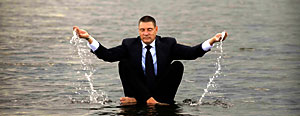|
"He who seeks God in some way (read meditation technique
or ritual),
grasps the way and loses God, who dwells in the way. But he who seeks
God without a way, grasps God and lives with the Son."
Meister Eckhart - Doctor Ecstaticus
"Man has to seek God in error, forgetfulness and foolishness."
Meister Eckhart
"If you want to succeed,
double your failure rate."
Thomas J. Watson
Thanks to the Hippies
Through the time of the hippies in the '70s, the East began to influence the
West. The Beatles
started practicing
meditation under the guidance of an Indian guru, leading to a gigantic
cultural 'experimentarium' with far greater importance than even their music.
Valuable cultural information from around the globe is now synthesized into a
new life stream of global culture, thanks to exponential advances in travel and
information sharing.
I lived in sync with that flight of Icarus, where some got lost in drugs and
others in extreme political activism. Amidst this mix, there was also gold. I
grew up as a teenager worshipping Jimi Hendrix on my solo guitar, and I had hair
long enough to sit on. Today, I am bald. The only thing that survived all these
years was meditation and breathing techniques. I am so thankful for that!
Prologue
What did India learn us? Anyone who has experienced the traffic
in an Indian mega-city will come to know: In the midst of chaos,
just relax!
An English proverb says: "God takes care of the ignorant."
By embracing a sense of foolishness within yourself, the body's
self-improving intelligence is activated. In this sense,
meditation is fundamentally not a scientific endeavor. This does
not mean that meditation is anti-scientific, but rather that it
involves completely different parts of the brain, which are
often, though not always, inversely proportional in size due to
evolutionary trade-offs.
Our mainstream Western societies worship science, and with good
reason. Science and reason have brought us to our current living
standards, which, despite their imperfections, are better
overall than those of any other culture in history. For those
who doubt this, I urge you to read world history back to ancient
times.
However, the blessing of scientific thinking came with a curse.
When scientists began to lead the investigation into meditation
and/or psychedelics, they became like priests or gurus in a
culture where science and reason have replaced God within the
same system of blind worship. Just as leaders of cults or any
other organized religions are often the least spiritual people,
we now have a collective of rational minds, often with little or
no capability and wisdom to live in meditation, taking a
significant lead in formulating what meditation is.
Why do I mention this here? It is because, in actual meditation,
there is nothing to understand. In fact, rational thinking must
be rational enough to shut itself down—not forever and in all
matters—but it must recognize that there are other highly
intelligent non-verbal systems within the wonder of the human
brain-body that know all about how to meditate. We need to step
down from the throne of understanding for these systems to
meditate for us.
I am not at all against science, but reason must know itself and
its limitations in a self-aware loop and then be clever enough
to allow something else to take over. You go to a dentist (a
profession that, by the way, was perfected through science) when
you have tooth problems. You surrender to the expertise of the
dentist in the sense that you do not need to understand every
move they make.
In meditation, you surrender to your inner tour guide. He will
take you on the profound journey of not understanding.
"In unknowing knowing shall we know God."
Meister Eckhart
Meditation is a Lifelong Project
Meditation takes your entire life and gives it back to you in a new
form.
Of all the things I have done in my life, I consider the moment I
discovered meditation as a young man the most fortunate event. It
evolved into a wonderful journey marked by error, forgetfulness, and
foolishness, leading me to a life in old age where I can now sum it all
up in one simple word:
'Gratefulness.'

WHAT TECHNIQUE SHOULD I USE?
What is now the best meditation
technique in order to arrive in that promised land of peace and
thankfulness? I would say all techniques and none of them. I've tried
most of them, but essentially, I arrived in that state by sitting
alertly with closed eyes and doing nothing.
Let me state that I have not reached that advertized state of
enlightenment. However, what I have gained is so much better than the
state I was in ten years ago, twenty years ago, and so on. My life
gradually became better and deeper, allowing me now in old age to be
here and state: It is wonderful to be
alive!
Listen to what Franz Kafka has to say:
"You need not do anything. Just remain
at your table and listen.
You don't even need to listen, just wait. You don't even need to wait,
just learn to be quiet, still, and alone. And existence will come to you
by itself
and offer itself to you. It has no choice; it will roll in ecstasy at
your feet."
Here, in that potent passiveness, I
realized that the repetition of mantras is in danger of running in
circles, leading internally to a state not much different from the
societal alienation described in Kafka's books.
For the one who sits with what is, without doing anything, not even
using a meditation technique, everything will be given in the form of
fine-tuned intuitions from within. These tiny, blessed 'innerstandings,'
as Sunyata would say, will light up the next step on the path.
This refined, innerstood intuition might, in fact, urge you to repeat a
mantra or play with any meditation technique, but now that very same
practice is not dictated by the ever-controlling mind. So, as long as
you spontaneously enjoy your routines, they can
definitely make a difference.
Meister Eckhart states that God prefers
great mistakes over small ones. Following our interoceptive
innerstandings is also the true path of divine errors. Good advice makes
the head more clever, helping you avoid pitfalls. Mistakes, on the other
hand, make the body wiser. That is why I see and feel my wisdom sitting
like stargates in the scars of my inner body. These wonderful scars are
what I got walking mindlessly in blindfolded trust.

THE RESTLESS MIND
"You are irritated by every rub,
how will your mirror be polished?"
Rumi
I've often experienced impatience in myself and others. This
impatience does nothing but put the cart before the horse. In this
context, I think of Napoleon's famous words:
"Dress me slowly, for
I am in a hurry!"
The Catarpillar-Ego
This impatience stems from our mind.
However, the thinking-based ego-mind cannot become spiritual in the same
way that a caterpillar cannot become a butterfly. The point is, the
caterpillar dies on a cellular level in the process where the butterfly
unfolds. Not a single caterpillar cell gets the honor and joy of
becoming part of a butterfly. It is not the caterpillar that becomes a
butterfly. It is something that has transcended the cellular life of a
caterpillar. At the point of metamorphosis, both the caterpillar and the
butterfly produce poison to kill each other. The caterpillar-mind lives
in the world of meditation techniques, and therefore, at a certain
point, these techniques become poison for the unfoldment of your
spiritual life.
The mind in search of gurus, retreats, and more advanced meditation
techniques is like a caterpillar-person putting on fake butterfly wings
and convincing itself and the world that it is the butterfly of the
soul.
Therefore, at some point, we have to give up spiritualizing ourselves.
As ego-driven humans, we are caterpillars—nothing more and nothing wrong
in that. One day, a
butterfly will be born in us, but we will not witness the birth. For the
birth itself is our death:
"You must be willing to burn yourself
in your own flame;
how could you rise again if you have not first become ashes?"
Friedrich Nietzsche
I know such statements do not sell
tickets. But I'm not interested in selling meditation techniques anyhow
because they are created by an ego-mind that wants to spiritualize
itself through understanding and control.
The Business of Spirituality
The restless 'Californicated' Western mind loves ideas like
self-improvement. In this sense, meditation techniques have become a
kind of commodification of spirit. The more techniques are seen as
important, the more there is to sell in the form of courses, retreats,
mantras, and self-development.
What is the essence of life? It is peace and love. Can you buy love from
a prostitute? No, you cannot. Can you buy true peace on a meditation
course with a famous guru? No, you cannot. As long as we are all clear
about the conditions, there is, as far as I am concerned, nothing wrong
with prostitution or paid retreats. We must, however, realize that these
gratifications are for our caterpillar life only. And at some stage, we
are all caterpillars.
That is why Meister Eckhart says:
"Merchants go when the
truth appears,
for the truth needs no merchanting.
Behold thy temple cleared of merchants."
My friend Johannes from Zurich, who is a
practicing Buddhist and fluent in Tibetan, says: "Om mani padme hum"
has turned into "Om money give me soon."
The Quantification of the Soul
A fundamental layer upon which the commodification of the soul takes
place is the modern tendency of 'protocollizing' oneself. YouTube is
full of young, sporty American men advocating for all kinds of
overcomplicated meditation and breathing protocols that make them
important and the listener lost. The mind invents all sorts of
quantifiable agents like: do this technique for so many minutes in this
specific way and breathe while counting 4-7-8 or 7-7 or whatever.
Now listen
to what Meister Eckhart has to say on this matter:
"This spirit knows no
time nor number:
number does not exist apart from the malady of time."
One of the challenges with turning
meditation into a tool is that the soul is entirely valueless,
understood as value-less. It is devoid of value in the sense that it
is the unotized agent like a screen in a cinema that gives all other
things value. Hence our soul cannot be trained like a
bodybuilder's muscles. It is already perfect, but we left it when
we went out to improve it.
Listen with this in mind to Rumi:
"Your task is not to seek for love, but merely to seek and find
all
the barriers within yourself that you have built against it."
One such barrier is the adoration
of techniques. While quantifying our spiritual practice seems
rational, it removes us from the most vital aspect of
meditation: the ability to sit in spontaneous communion with our
vigilant awareness and feel—sense—listen to all the wordless and
ever-morphing landscapes of micro sensations taking place in our
interoceptive body realm. In fact, it is these various minuscule
signals from the multiple operative systems within us that need
our space-holding attention to guide us to the next breath we
take or the next move we make. These archaic operative systems
do not understand the language of words and numbers. Most of them were
invented
by evolution long before we were able even to growl.
This path of inner attentive sensing without agendas is a much murkier,
muddier, and more organic way to approach meditation. It is a creative
process, an art form where you and your life become a living piece of
art.
"When you do things from your soul,
you feel a river moving in
you, a joy."
Rumi
Every Truth is Half-Baked
Having said that, I now have to contradict myself. For every
viewpoint sees only part of the truth. In this sense, meditation is soul
surfing on a life ocean full of clashing waves. Spiritual growth is not
linear and is full of paradoxes. It is each soul's task to surf the
balance between them. Otherwise, the opposite of what we cling to will
always turn out to be the truth that hits us out of balance.
In accordance, I must be vigilant enough not to judge the business of
spiritual commodification with resentment. Everything is, in fact,
perfectly imperfect, or maybe even so that imperfection is as needed as
perfection. How can we learn to soul-surf if we are not constantly
thrown off the board?

EFFORTLESSNESS IN MEDITATION
"The non-existent can penetrate where there is no space.
Therefore, I recognize the value of non-action.
To learn without words and work without accomplishing,
few understand this."
Tao Teh King, Lao Tzu - 43
In my youth, I learned to practice
Transcendental Meditation. Nowadays I rarely meditate the TM way. However, I am
eternally grateful for receiving the most vital meditation
advice at an early age. The TM teachers kept repeating: Do not
use effort in your meditation. What marvelous advice!
In accordance with that glorious advice, I would like to
radicalize it even further and postulate:
We are not able to meditate!
I remember one day arriving at New
Delhi airport. I observed a group of Western senior meditators
with one hand in a small bag containing a little chain of beads.
They were constantly counting these beads while internally
repeating mantras to concentrate their minds. They looked tired
and dried out. Joy had left them together with their youth, and
now all they seemed to have left was the grumpy counting that
kept them away from a question they should have asked themselves
a long time ago, a question that would be harder and harder to
confront with each passing year of joyless self-discipline: Have
I wasted my life in joyless repetition?
Meditation is a happening, not something you do. For our old
ego-operating system, which is used to eating bread by the sweat
of its face, the fact that meditation only works without effort
is very difficult to relate to. Our culture has difficulty
understanding that you can achieve more by doing less.
Therefore, I say: If your meditation practice does not give you
solace, peace, and joy here and now, then drop it for God's
sake. There is only a pot of gold at the end of the rainbow that
makes you marvel at its colors at any given time.
I also repeat in joyful flow: We cannot
meditate. It is impossible.
To be Meditated
That we, as ego-entities, are not
able to meditate is, however, not contradictory to meditation as
such. In the realization that we cannot meditate, we can relax
and allow ourselves to be meditated. This is an effortless
process. In Sunyata's words, it is a happening in
'joyous ease.'
We could also say that to sit in joyous meditation is to sit
with grace, and in grace, we are removed from all work. As we
fall in love, we can also fall into meditation.
"The bird of
paradise lands only on the hand that does not grasp."
— Zen Proverb
"God is in all things, urging us to give up our will."
— Meister Eckhart
Make as little effort as possible
in meditation. In my experience, this sentence contains the most
important meditation teaching. Remember the Zen proverb:
"Sitting quietly, doing
nothing, spring comes, and the grass grows by itself."
Let me repeat like mantra: Let yourself be meditated.
Allow meditation to come to you; let it be a spontaneous,
natural process that the mind engages in simply because it
enjoys it. Let yourself be meditated!
Meditation becomes stiff when driven by conscious willpower.
When you actively chase the butterfly of the soul, you cannot
catch it. Only when you sit completely still, perhaps after
giving up the chase, might you be lucky enough for it to land on
your hand.
The "I," understood as the outward
ego-driven personality-interface, is as bad at meditating
as a cart is at pulling a horse.
An effortless Effort
What can be done, however, is to be meditated. Do an effort
to let yourself be meditated!
Let me give you an analogy. You take your little boat and row it
out and away from the shore and into the ocean. Then you put up
the sails of the boat, and by that act, you cannot do more. Now
all that is left is to wait for grace to fill your sails with
the breath of God. When that wind is breathing from within, you
have no doubt that a power much greater than you is doing
meditation on you.
A group of fellow Sufi travelers was dancing in celebration of
God's glory at sunset. They were singing over and over that all
is God's will only. The next day they discovered that their
camels had run away. So the Sufis say: Yes, all is God's will
but remember to tie your camels!
So you have to tie your camels and row your boat to the place
where the wind can catch you.
To be meditated, I must do something. This is a paradox
I leave open for you to live. For the dynamically fragile truth lies in the
cracks between theses and antitheses. The wonderful
Manav Dayal
said to me:
"The Highest can only be reached through an effortless effort."
So let me conclude by
contradicting the first section: You must make an effort if you
want to proceed further in the text. You might not get far in meditation without
a little self-discipline.
The Will You Need to Mobilize Does Not Exist
However, allow me to look a bit beyond these stories about
effort and non-effort. At the beginning of your journey, you
imagine that you at least have to row your boat, set your sails,
or tie your camels in the oasis in the desert. Looking back a
bit longer on your path, you might realize that even these
actions were not your own. Free will is, in fact, a wonderful
illusion. Once your awareness becomes a bit more vigilant, it
will look through the veils of will and perceive everything as
processed by holy algorithms.

The Graceful Epilogue of free
will
How can all this meditation be effortless effort? One way of
answering that could be with a quote from Thomas Edison: "I
never did a day's hard work in my life. It was all fun." The
same Edison also said, "There is no substitute for hard
work."
I would go a step further and declare: You cannot do meditation
unless you are called from within to do it. Meditation is grace.
TO BE CLEANSED FROM EGO-DRIVEN WILL
We are deeply accustomed to be in charge and in this proces we
combine insight with action.
We are used to the idea that we must do something to get
something and in this process we need to understand things
before we act.
Our entire external survival apparatus has been trained from
childhood to obey 'the necessary.' It’s about doing something,
becoming something, ideally becoming number one!
By understanding and then doing things, we transform the world into tools. By using
these tools, we achieve 'something.'
Meditation, by contrast, is about being passively aware
without striving to do or understand anything. That by itself
contradicts everything we have learnt since the first mammoth
hunt and much before. This habit of being in charge is so strong
that in order to reach the sweet flow zone spot between
intention and non-intention, most of us first of all need to
embark on a journey
of meditative let go. Here we will sink into that blessed well of
bewilderment, where everything we believed in and took ourselves
to be will questioned. Just a fingersnap second in this inner
death lead to a rebirth of who we take ourselves to be.
Meditation, if practiced in
courage and
freedom from organized religions and techniques, will
deconstruct
our prefabricated perceptions of what reality is and leave us in
a new and fresh world where, in William James' words, we will
re-experience everything in a state of blooming, buzzing
confusion.
This will, however, not lead to passivity! Action happens
spontaneously and effortlessly in awareness and consciousness of
the soul-surfer.
For this to occur, it is important that any insight or
meta-insight into your behavior is NOT followed by guilt or
sharp divisions of what is good or bad.
You perceive and realize yourself supported by trust and
non-judgment.
Meditative meta-insight occurs in the clear light of love, where
there is nothing to change. Everything happens on its own in a
transformation process beyond your control.
Best regards,
Gunnar Mühlmann




|









